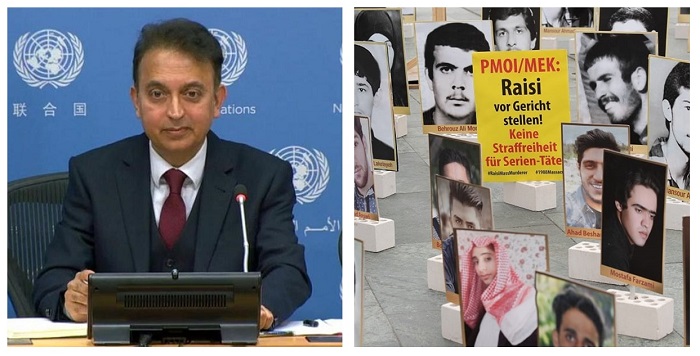
A report highlighting the level of human rights abuses and the Iranian regime’s impunity when it comes to those matters was presented to the United Nations General Assembly on Monday, October 25, by Javaid Rehman, the UN’s special rapporteur for the situation of human rights in Iran.
He explained that many of the perpetrators of these crimes against humanity currently hold powerful, high positions within the regime. Most notably, the regime’s new president, Ebrahim Raisi who’s candidacy was the catalyst for widespread protests across Iran due to his involvement in the massacre of political prisoners during the summer of 1988.
The National Council of Resistance of Iran (NCRI) said, “The massacre was instigated by a fatwa from then-Supreme Leader Ruhollah Khomeini, which branded members of Iran’s leading opposition group, the People’s Mojahedin Organization of Iran, as enemies of God and called for their systematic execution.”
Raisi had been assigned to Tehran’s ‘death commission’, a panel of judges tasked with interrogating prisoners about their political affiliations, and those who were deemed disloyal to the regime were sentenced to death.
Rehman confirmed in his report that in recent years, the regime has attempted to destroy any evidence of the massacre where possible. He said, “My mandate notes with concern the high number of acts of reprisals undertaken by security and the intelligence agencies against families of victims, human rights defenders, lawyers, journalists, and others calling for accountability.”
The NCRI said, “More than a year earlier, Rehman was joined by six other UN human rights experts in signing an open letter that called upon regime authorities to end this pattern of harassment and to adopt a policy of transparency regarding the 1988 massacre.”
The letter was published last December to an international audience after the regime failed to respond to the requests. The letter questioned why no follow up was made by UN bodies to concerns of the executions that were expressed to the UN General Assembly months after the 1988 massacre.
In a quote from the letter, it read, “The failure of these bodies to act had a devastating impact on the survivors and families as well as on the general situation of human rights in Iran and emboldened Iran to continue to conceal the fate of the victims and to maintain a strategy of deflection and denial that continue to date.”
In recent years, the lack of accountability of those involved in the massacre led to the regime asserting its impunity when they chose to crackdown on protesters during the November 2019 uprising. In many cities across Iran, the regime’s security forces opened fire on the crowds protesting in the streets. Over 1,500 people were killed in the process, with thousands of others injured. 12,000 arrests were made and many of those taken to prison were subjected to various methods of torture over a number of months.
The NCRI said, “The Iranian Resistance has held a number of events and issued a number of statements calling for the UN to establish a formal commission of inquiry into the 1988 massacre and for leading perpetrators like Raisi to be prosecuted in accordance with its findings.”
Such a prosecution could be carried out in the International Criminal Court, or alternatively, using the principle of universal jurisdiction in any country around the world that wishes to do so.